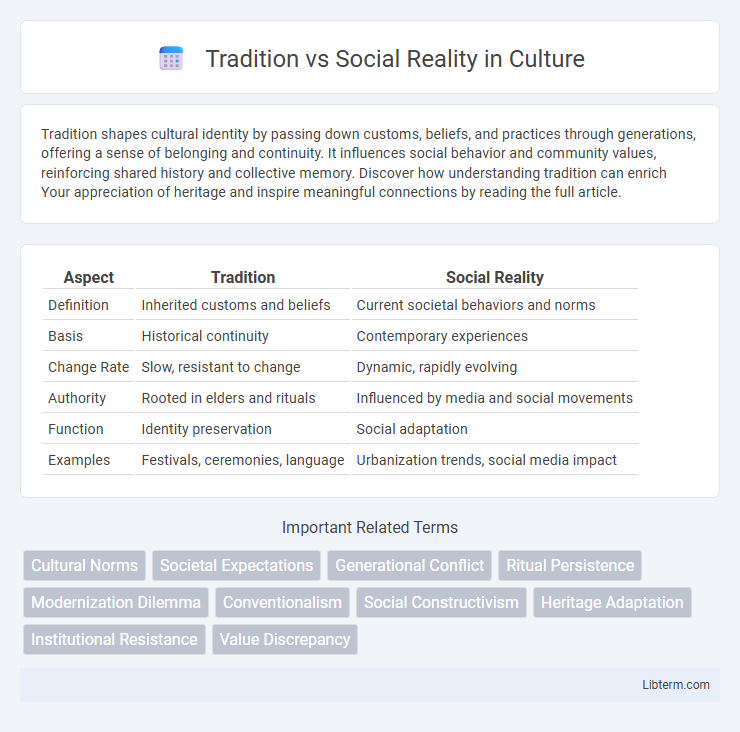Tradition shapes cultural identity by passing down customs, beliefs, and practices through generations, offering a sense of belonging and continuity. It influences social behavior and community values, reinforcing shared history and collective memory. Discover how understanding tradition can enrich Your appreciation of heritage and inspire meaningful connections by reading the full article.
Table of Comparison
| Aspect | Tradition | Social Reality |
|---|---|---|
| Definition | Inherited customs and beliefs | Current societal behaviors and norms |
| Basis | Historical continuity | Contemporary experiences |
| Change Rate | Slow, resistant to change | Dynamic, rapidly evolving |
| Authority | Rooted in elders and rituals | Influenced by media and social movements |
| Function | Identity preservation | Social adaptation |
| Examples | Festivals, ceremonies, language | Urbanization trends, social media impact |
Defining Tradition and Social Reality
Tradition encompasses beliefs, customs, and practices passed down through generations, shaping cultural identity and social norms. Social reality refers to the shared understanding and constructed perceptions within a community that influence behavior and societal interactions. The dynamic interplay between tradition and social reality highlights how inherited values adapt to contemporary societal contexts.
Historical Context: The Evolution of Traditions
The evolution of traditions reflects the dynamic interplay between historical events and societal changes, illustrating how customs adapt over time to shifting social realities. Traditions rooted in ancient practices often transform as communities respond to technological advancements, political movements, and cultural exchanges. Understanding this historical context reveals how social realities continuously reshape traditions, ensuring their relevance and resilience in contemporary society.
Social Reality in Contemporary Society
Social reality in contemporary society is shaped by rapidly evolving cultural norms, technological advancements, and global interconnectedness, which constantly redefine social roles and behaviors. Urbanization and digital communication platforms intensify the transformation of social interactions, fostering new identities and communities beyond traditional frameworks. Economic shifts and social movements further influence collective consciousness, challenging established traditions and promoting inclusivity and diversity.
The Clash: When Traditions Meet Modern Values
The clash between tradition and social reality emerges as longstanding customs confront evolving modern values, creating tensions in cultural identity and social norms. Traditional practices often emphasize communal continuity and inherited beliefs, while contemporary social realities prioritize individual rights, equality, and innovation. This intersection sparks debates in areas such as gender roles, family structures, and governance, highlighting the dynamic negotiation between preserving heritage and embracing progressive change.
Tradition as a Source of Identity
Tradition serves as a fundamental source of identity by preserving cultural heritage, values, and customs that define communities across generations. It provides continuity and a sense of belonging, reinforcing social cohesion and distinctiveness within evolving societies. While social reality changes, tradition anchors individuals to their roots, shaping personal and collective identity.
Social Dynamics and Changing Realities
Social dynamics constantly reshape cultural norms as traditional values encounter evolving societal behaviors and technological advancements. Shifts in demographics, urbanization, and digital communication platforms accelerate changes in social roles and collective identities. Understanding these changing realities reveals how societies negotiate between preserving heritage and embracing modernity.
Generational Perspectives on Tradition
Generational perspectives on tradition often reveal a dynamic tension between preserving cultural heritage and adapting to contemporary social realities. Older generations tend to emphasize the importance of maintaining traditional customs as foundational to identity, while younger generations may prioritize inclusivity and innovation, reflecting evolving social values. This intergenerational dialogue shapes how traditions are reinterpreted, ensuring their relevance in modern society.
The Role of Media in Shaping Social Reality
Media plays a pivotal role in shaping social reality by selectively framing events and issues, thereby influencing public perception and cultural norms. Through repeated representation and agenda-setting, media outlets construct narratives that reinforce or challenge traditional beliefs and social structures. This process affects collective attitudes and behavior, often blurring the line between tradition and contemporary social realities.
Balancing Tradition and Progress
Balancing tradition and progress requires acknowledging the cultural heritage that shapes social values while embracing innovation that drives societal growth. Integrating time-honored customs with contemporary social realities promotes sustainable development and cultural continuity. Effective social policies encourage adaptation without eroding core traditional identities, ensuring harmony between historical legacies and modern advancements.
Future Outlook: Adapting Traditions to New Realities
Adapting traditions to new social realities requires a dynamic approach that respects cultural heritage while embracing innovation and inclusivity. Emerging technologies and shifting societal values drive the evolution of customs, enabling communities to preserve identity amid globalization and digital transformation. Future outlooks emphasize flexible frameworks that balance continuity with progressive change to sustain relevance across generations.
Tradition Infographic

 libterm.com
libterm.com